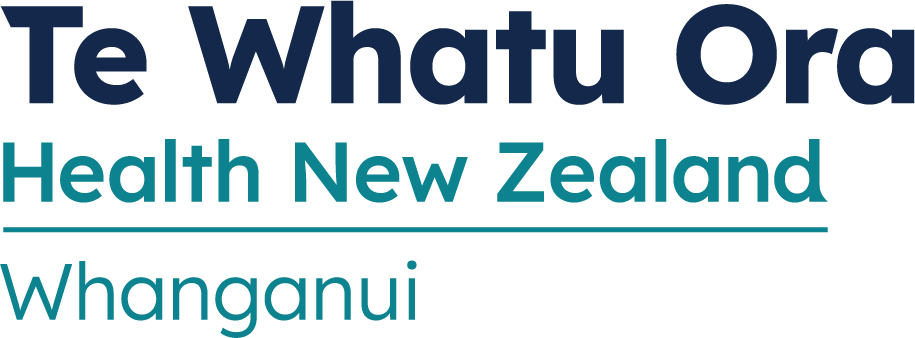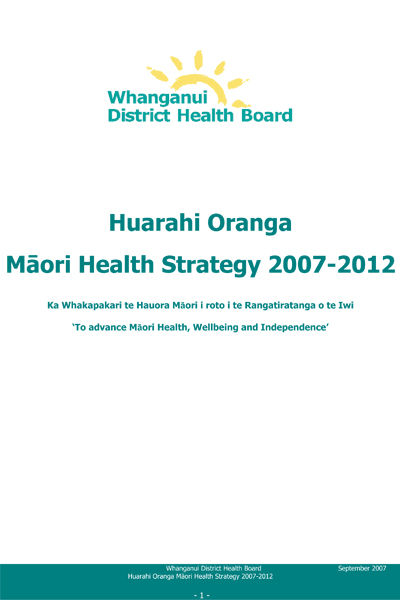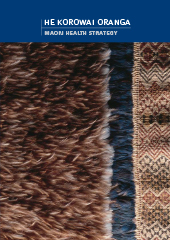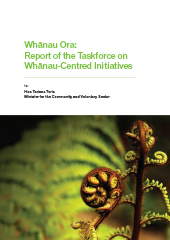
HOTLINKS
Māori Health Key Documents
Click on the report cover or title links below to view the full report in PDF format.
| Maori Health Plan 2013-2014 (PDF, 4MB) The Māori Health Plan (MHP) is designed to parallel the WDHB Annual Plan and the WDHB Huarahi Oranga, Māori Health Strategy 2007-2012. The purpose of this strategy is to guide and direct the planning, purchasing and delivery of health services in the district health board area to improve Māori health outcomes and reduce inequalities. |
|
| Sudden Death Protocol (PDF, 1MB) The Sudden Death Protocol agreement sets out the roles and expectations in the management of tupapaku (a deceased person) while providing a framework to help manage the process. |
|
 |
Huarahi Oranga: Maori Health Strategy 2007-2012 (PDF, 1MB) The Whanganui District Health Board (WDHB) Huarahi Oranga, Māori Health Strategy 2007–2012 is a guide to the planning, purchasing and delivery of health services in the WDHB district area to improve Māori health outcomes and reduce inequalities over the 2007-2012 period. This strategy was developed by the district health board in partnership with Hauora A Iwi whose Strategic Plan “Leadership to Advance Māori Wellbeing”, September 2006 was an important consideration. Key stakeholders, health providers including iwi health provider organisations, primary health organisations (PHOs) and mainstream primary and secondary health services were consulted in the development of the Māori Health Strategy. |
| The Health of Children and Young People in Whanganui (PDF, 5MB) This report is the first on the health of Whanganui children and young people produced by the NZ Child and Youth Epidemiology Service, and utilises the recently developed NZ Child and Youth Indicator. Framework. Due to its large size, the report is presented as reference manual, which begins with a set of instructions outlining how the information contained within it might be used to inform planning in child and youth health. |
|
 |
He Korowai Oranga: Māori Health Strategy (PDF, 1MB) He Korowai Oranga: Māori Health Strategy sets the direction for Māori health development in the health and disability sector. The strategy provides a framework for the public sector to take responsibility for the part it plays in supporting the health status of whānau. The overall aim of He Korowai Oranga is whānau ora - Māori families supported to achieve their maximum health and wellbeing. Whānau (kuia, koroua, pakeke, rangatahi and tamariki) is recognised as the foundation of Māori society. As a principal source of strength, support, security and identity, whānau plays a central role in the wellbeing of Māori individually and collectively. He Korowai Oranga asks the health and disability sectors to recognise the interdependence of people, that health and wellbeing are influenced and affected by the ‘collective’ as well as the individual, and the importance of working with people in their social contexts, not just with their physical symptoms. Whānau ora is a strategic tool for the health and disability sector, as well as for other government sectors, to assist them to work together with iwi, Māori providers and Māori communities and whānau to increase the life span of Māori, improve their health and quality of life, and reduce disparities with other New Zealanders. Click here for He Korowai Oranga: Māori Health Strategy - Maori version (PDF, 1MB) |
 |
Whānau Ora The Ministry of Health is working with Te Puni Kōkiri and the Ministry of Social Development to implement government decisions on Whānau Ora, in response to the Report of the Taskforce on Whānau-Centred Initiatives attached. For more information on Whānau Ora refer to the following websites: |
| Rongoā Māori Rongoā Māori is informed by a body of knowledge that has as its core the enhancement of Māori wellbeing. In this way, rongoā Māori differs from a Western medical paradigm, whose focus is principally the absence of health and wellbeing and treatments/interventions to return to a state of health. Rongoā Māori traditional healing is formulated in a Māori cultural context, in which the understanding of events leading to ill health and its impacts are addressed through a range of culturally bounded responses. These responses include rakau rongoā (native fauna herbal preparations), mirimiri (massage) and karakia (prayer). The Ministry of Health works with Māori traditional healing practitioners to support rongoā Māori within the health and disability sector. For a number of years the Ministry has discussed with rongoā whānau – including traditional healers, Māori health providers and iwi – the role that traditional healing has with mainstream services. In December 2011, a new national rongoā governance body – Te Kāhui Rongoā Trust – was established to protect, nurture and promote rongoā Māori. Its seven interim trustees are working to have the trust fully operational by June 2012. Click here for more information about Te Kāhui Rongoā Trust |
|



